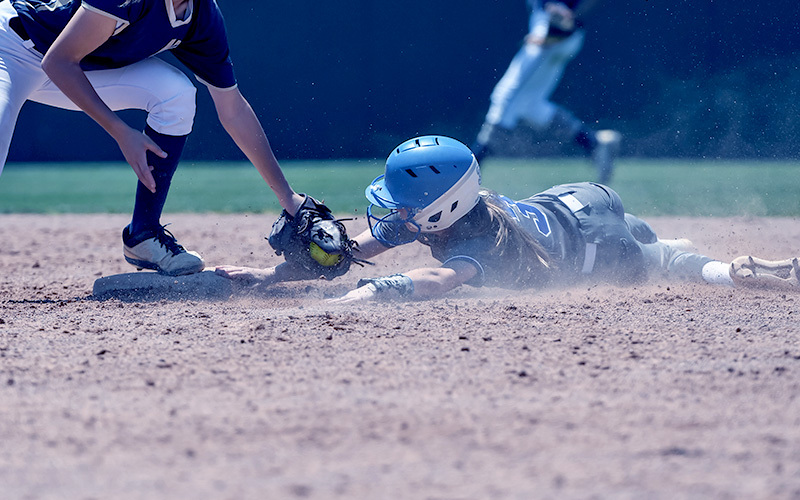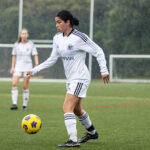Athletes and fatigue: Why am I so tired?

Working out can boost physical and mental energy. Yet sometimes, athletes feel more fatigued than energized.
“Feeling tired after a tough workout or bad night’s sleep is normal and temporary,” says Nicole Farnsworth, clinical nutrition specialist in the Sports Medicine Division at Boston Children’s Hospital. “Fatigue is a problem when it interferes with an athlete’s everyday life.” Fatigue might set in at certain times of day or during certain activities. It might feel like a physical heaviness or an inability to concentrate. “I see fatigue affect athletes in different ways, but it tends to occur repetitively and in an ongoing manner.”
What can an athlete do if fatigue makes getting through the day a struggle? Here, Farnsworth talks about fatigue, possible causes, and how athletes can address it.
How does fatigue affect athletes?
Chronic fatigue can have a negative effect on both physical and mental performance. A fatigued athlete may have less energy to exert themselves during practice or a game. They may also have trouble staying focused, both on the field and in the classroom.
What causes chronic fatigue in athletes?
Our understanding of fatigue has changed in recent years. For a long time, if an athlete had chronic fatigue, the first thought was that they must have some sort of iron deficiency. While this can certainly cause fatigue, there are several other possible causes.
We see a large number of athletes with low energy availability. These athletes are not consuming enough calories to support the energy demands of their sport. Fatigue can also stem from a carbohydrate deficiency. Carbohydrates are what our bodies use for energy. They’re also our brains’ primary source of fuel. An athlete in a low energy or low carbohydrate state is very likely to feel fatigued.
Poor nutritional timing can also cause fatigue. Skipping breakfast or only having a nutrition bar for lunch does not provide enough energy to keep an athlete going throughout the day.
Less often, fatigue may be a symptom of a medical condition such as Crohn’s disease or celiac disease. An athlete may have a healthy, balanced diet but may not be absorbing the nutrients they need. Mental health issues, such as depression, can also cause persistent fatigue.
All of this is to say that fatigue has many possible causes. Jumping to the conclusion that an athlete’s fatigue is caused by an iron deficiency may miss the opportunity to find and address another underlying issue.
Can an athlete with fatigue take iron supplements and see if that works?
I don’t recommend blindly supplementing iron. For one thing, it’s possible to take too much iron, which really isn’t healthy. If an athlete has a suspected iron deficiency, I always recommend they meet with a physician who can test their iron levels. If they have an actual deficiency, it will be important to know how low their iron is in order to develop an appropriate treatment plan.
Are some athletes more prone to fatigue?
Athletes who participate in sports that place a high value on lean bodies, such as figure skating, running, and lightweight rowing, tend to be at higher risk for low energy availability. Iron deficiency is more common in athletes who menstruate because their iron needs are higher. Endurance athletes and those who are vegan or vegetarian also are at higher risk of iron deficiency.
But all athletes can be prone to poor nutritional timing, carbohydrate deficits, or low energy availability, which can lead to chronic fatigue.
What is your advice for athletes struggling with fatigue?
Persistent fatigue isn’t normal. If fatigue is interfering with an athlete’s performance or schoolwork, or making it hard to enjoy their free time, I really encourage them to talk to a sports medicine physician or registered dietitian. Very often there is a reason — and a solution — for persistent fatigue.
Learn more about the Sports Medicine Division and Female Athlete Program.
Related Posts :
-

3D imaging could become standard practice in orthopedics. Here’s how.
It took a trained eye to see the abnormality on the patient’s X-ray. There, hidden behind the acetabulum was ...
-

Ask a sports medicine specialist: Why are ACL tears so common among female athletes?
When an athlete is sprinting after an opponent who suddenly stops or changes direction, their anterior cruciate ligaments (ACLs) make ...
-

Jackie’s dreams of playing professional soccer back on track after ACL surgery
From her dorm in Newcastle, England, Jackie Zapata can hear fans roaring in the soccer stadium a few blocks away. ...
-

The surprising energy demands of marathon training
Training for a marathon? Are you eating enough to help your body recover from one long training run and gear ...





